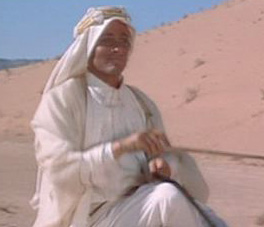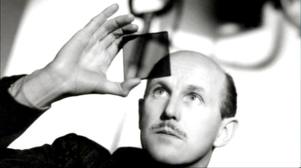In England, sometime in 1922, a young boy went to the Central Cinema in Reading cinema to see the latest moving picture sensation, Rex Ingram’s The Four Horsemen of the Apocalypse. David Lean was overwhelmed and much later told Kevin Brownlow: “He was my idol. He was absolutely staggering. Wonderful.” On another occasion, he explained, “Nowadays, if you look up Ingram’s record, you see him described as ‘a great pictorialist’. You know, they accuse me of being pictorial. It probably has to do with Rex Ingram. Anyway, I’m really grateful for it.” Another of Lean’s favourites films was Ingram’s 1926 film, Mare Nostrum, shot while he was working out of the Victorine Studios. Lean’s final, unrealised film was Nostromo, to be shot in the Victorine Studios.

Another North African film was to link the two men across the decades. When he heard of the publication of The Seven Pillars of Wisdom, Ingram wrote to Lawrence and the two men began to correspond, drawn together by their love of the desert and their common Irish origins. Ingram may have inquired about the possibility of shooting the story - Lawrence certainly organised for him to receive a copy of his book. Accidentally, two copies arrived. In a gesture that was well-intended but impractical, Ingram dashed off a letter of gratitude to Lawrence suggesting that the military man might like a gift of a bookshelf of books. Lawrence was posted with the RAF in Karachi at the time and politely declined the offer on the grounds that he would have nowhere to put such a bookshelf and wasn’t, in any case, much inclined towards possessions. The Letter from T. E. Lawrence (written as T.E. Shaw) to Rex Ingram, 21 July 1927, is available from the internet archive.
In the end, it was David Lean who finally made the great T. E. Lawrence, film, Lawrence of Arabia, in 1962.

The year before David Lean’s moment of revelation, in 1921, a Welshman, recently demobbed from the army, bought a lease on the Hôtel du Parc (which he subsequently renamed La Voile d’Or) in St Jean Cap Ferrat, in the South of France. Captain Powell was one of the many expatriates on the Riviera, a man described by his son as “energetic, ruthless, tireless.” In his first volume of memoirs, A Life in Movies, Michael Powell remembers the Riviera of those days as a place for wintering only;
Nobody who was anybody would have been seen dead there in the summer months. It was too hot. All the grand villas, all the terraces and colonnades, all the fountains and ornamental pools, all the gardens full of oranges and lemons, loquats and figs, bougainvilleas and geraniums, were silent and deserted. The idea of lying in the sun to make your body as much like an African native as possible would have been greeted with shrieks of horror.
Sent to work by well-meaning relatives in the National Provincial Bank, the young Michael Powell sustained himself with trips to the cinema and dreams of becoming a director. On a visit to France, he shared these ambitions with his father who took him to look around the studios at Joinville. But it was a subsequent visit to the South of France that sealed the young man’s fate and ensured that his days as a bank clerk would come to a swift end. Captain Powell had come across an American film crew working in Nice and invited them to dinner at Maxim’s so that they could meet his son. Unbeknownst to him, the crew was Rex Ingram’s, then filming Mare Nostrum, and Ingram was one of Michael Powell’s greatest heroes. The next day, Harry Lachman, the American artist turned set designer and subsequently film director (in 1931, David Lean was appointed editor on Harry Lachman’s North African drama, Insult), offered Powell a job at the studios. And so began a career in cinema that was indebted to Rex Ingram, not just for the under-paid position at the Victorine in 1925, but for the romanticism, the daring, and the artistry of filmmaking. By 1926, Powell had risen to become an assistant director and also makes a brief appearance, as the man with a balloon, in The Magician (1926).
To the end of his days, Powell, when asked about his influences, never failed to mention Ingram’s name. Many years later, long after Ingram’s own career was over, and Powell too was being labelled a dangerous maverick (Sam Goldwyn was unimpressed with what he had seen during a preview screening of The Elusive Pimpernel [1950]), the two men were reunited in California. Somewhat dreading seeing his mentor since their fortunes had taken such different routes, Michael Powell found himself once more bowled over by Ingram’s charm and presence - the gold bracelet still on his wrist, the gold necklace around his neck, Alice Terry on his arm. Ingram in turn was delighted by the success of the man who had started his career mopping the floor of the Victorine Studios and inscribed a copy of Mars in the House of Death to him with the words, "Keep on showing them, Micky."
One of Ingram’s friends on the Riviera in the 1920s was F. Scott Fitzgerald. Ingram read and enjoyed The Great Gatsby, writing to Fitzgerald that: “Gatsby is very fine: it is full of sentiment without being sentimental – Gatsby was a sentimentalist but on so heroic a scale that he was magnificent. Everyone of your characters prove that the U.S.A. is uninhabitable – they are all to [sic] the life.” Both men shared a cynical attitude to Hollywood, working for it and despising it at the same time. Fitzgerald was struggling to write what would become Tender is the Night and in one of his drafts, later discarded, he modelled his main character, Lew Kelly, on his friend. Kelly is an Irish director, educated in Yale who has had a number of extraordinary successes in Hollywood but is now disillusioned and en route for the South of France. Little of that version, however, found its way into the finished novel.
The tribute that Rex Ingram may have most valued, however, came from fellow Irishman, James Joyce. Finnegan’s Wake (1939) contains the line: “his scaffold is there set up, as to edify, by Rex Ingram, pageant-master.”